NPR Gives a Party for Berklee
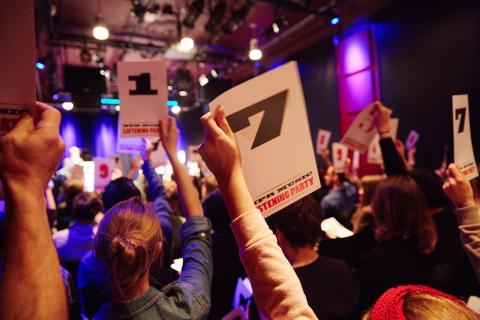
Listening Party attendees hand down their judgements in the Red Room at Cafe 939.
Photo by Kelly Davidson
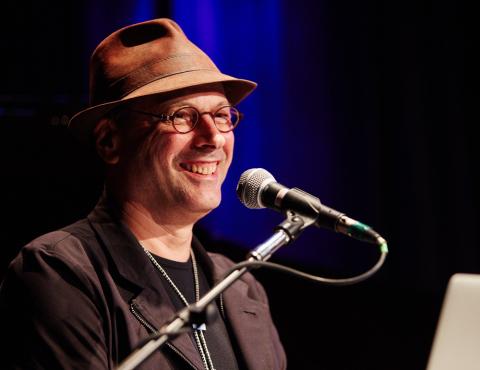
Bob Boilen
Photo by Kelly Davidson
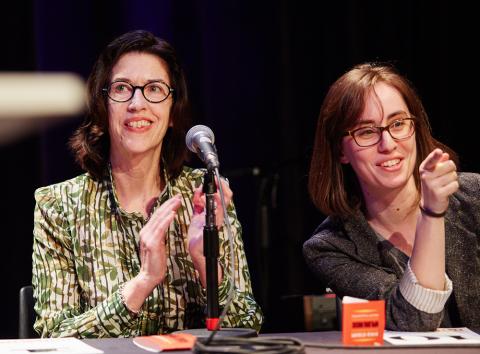
Berklee's Susan Rogers (left), a member of the Music Production and Engineering faculty and Amelia Mason of WBUR's the ARTery
Photo by Kelly Davidson
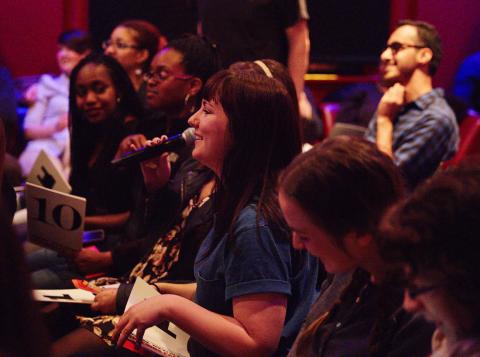
Students and others in the audience were given opportunities to explain their ratings.
Photo by Kelly Davidson
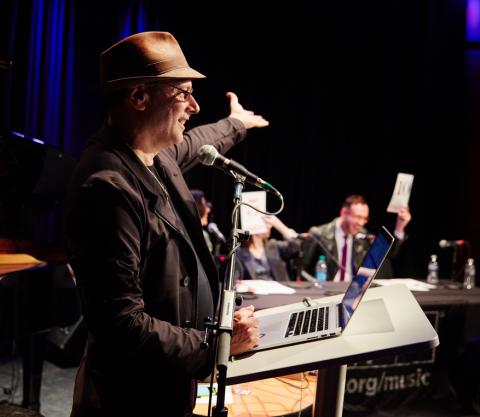
Bob Boilen invites audience members to hold up their cards.
Photo by Kelly Davidson

Gem Club, featuring pianist and vocalist Christopher Barnes, perform at the end of the listening party.
Photo by Kelly Davidson
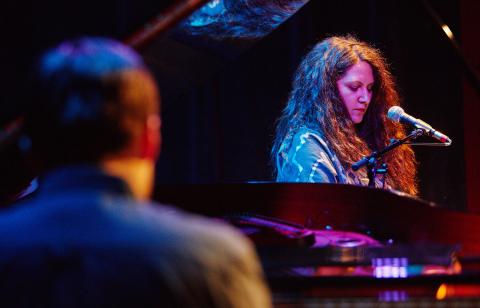
Christopher Barnes and Ieva Berberian of Gem Club are both Berklee graduates.
Photo by Kelly Davidson
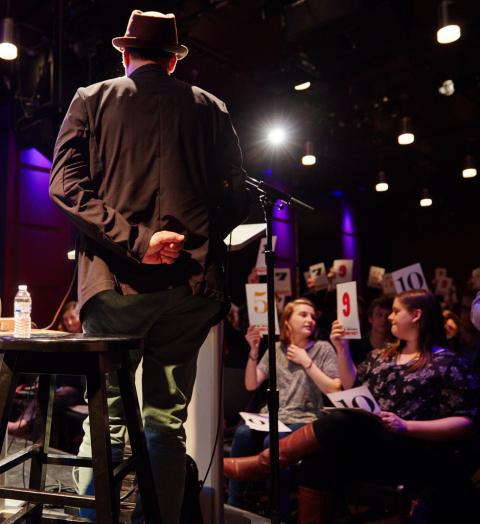
An NPR Listening Party encourages everyone to own their opinions, even when disagreeing with a friend.
Photo by Kelly Davidson
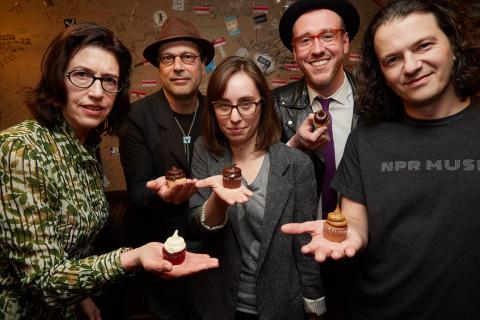
The Listening Party tune selectors pose ... with cupcakes, naturally. From left: Susan Rogers, Bob Boilen, Amelia Mason, James Reed, and Stephen Thompson.
Photo by Kelly Davidson
At Berklee, the musical transaction typically revolves around making music and putting it out into the world. Students work hard at developing their skills in composing, performing, producing, and marketing music, among other aspects of being a musician. But on one evening recently, visitors to the Boston campus emphasized the other end of that equation: listening.
Not that Berklee students don't spend large amounts of time listening very carefully and analyzing music, but when NPR's Bob Boilen and Stephen Thompson presented a listening party in the Red Room at Cafe 939, they asked that everyone in attendance respond on a gut-level to what they were hearing rather than subjecting it to heavy analysis.
The task at hand was to listen to a short snippet of a dozen tunes and issue an immediate reaction to each track, whether good, bad, or somewhere in between. Audience members were asked to communicate their opinions by holding up one of a stack of cards numbered from 1 to 10.
"They hold up a 10 if they love, and if they don't, it's a 1 . . . so we play some music, people hold up cards, we walk around the room with a microphone, and begin a conversation about likes and dislikes of the song," said Boilen, one of the hosts of All Songs Considered, the day after the listening party.
Berklee Considers 'All Songs'
Boilen and his team have held such events around the country, but never packaged the ensuing debate for the internet airwaves until the Berklee listening party because, he said, the conversation went to a deeper level in terms of song design, lyrics, and production. One of three panelists for the night, Susan Rogers—a member of Berklee's Music Production and Engineering faculty who has worked as a mixer/engineer for Prince and David Byrne and holds a Ph.D. in psychology—provided a cogent bit of science to explain why good songs work.
"Coming from the field of psychology, we know that human beings prefer to have their stimuli strike the perfect blend between complexity and simplicity," said Rogers just after the crowd had listened to Jackie Deshannon's "When You Walk in the Room." "Because everything regresses toward the mean, the music that most people buy—popular music—has struck the perfect balance . . . it's simple enough that we recognize it, but it needs some character of newness about it."
Rogers and her two copanelists—writer Amelia Mason of WBUR's the ARTery and Boston Globe music critic James Reed—as well as Boilen and Thompson, each selected tracks to play during the night. The list of songs (see below) ranged from R&B and indie rock to hip-hop and solo piano and covered releases issued between 1964 and today. No one selection was unanimously embraced or reviled and each provoked some amount of dischord, with some of the longest and sharpest discussion focusing around Kacey Musgraves's "Biscuits" and Kate Tempest's "Lonely Daze."
"I think being here is going to help me be more open to other people's music," third-semester baritone saxophonist Ayanna Jacobs-El said at the end of the night. "When you're listening, don't just hear the first chord and be like, 'I don't want to hear anymore.' Just listen all the way through."
Back to Basics
During the two-day visit—an project created and executed by Audrey Harrer, Berklee's associate creative director in the Digital Learning Department—Boilen and Thompson also held an informal Q&A session with Berklee students. Among those in attendance were members of Grey Season, a band of students and alumni that fuses rock, folk, and bluegrass. Grey Season bassist Ian Jones later said that he and his bandmates are long-time fans of Boilen's work, and had once submitted a video to the Tiny Desk Concert Contest. The submission wasn't selected, but Jones said the band remains inspired by the series and by Boilen in general.
"It seems like Tiny Desk has no rules. It's just about whether the music is good," Jones said. "Bob wants to know that the artist is saying something or has a special vibe, which is really cool. It's not about whether the band is going to be big, but whether the music touches him and he gets a visceral reaction."
Among the bands that have ignited Boilen's interest over the years are several featuring Berklee alumni, such as St. Vincent, Lucious, Lost in the Trees, and Kishi Bashi.
The listening party ended with a beautiful set of chamber pop from the alumni duo, Gem Club, featuring Christopher Barnes (piano, vocals) and Ieva Berberian (keyboards, electronics, vocals). This time the music was greeted not with numbered cards or lively debate but raucous applause and unanimous approval. It was a reminder that there are times when music need not be judged, critiqued, or talked about, but simply, listened to.
Listen to our interview with Bob Boilen.
Listening Party Tracklist
- Pops Staples, "Somebody Was Watching"
- Ibeyi, "Ghosts"
- Gorilla Toss, "Billy Blood Idol"
- Kate Tempest, "Lonely Daze"
- Kacey Musgraves, "Biscuits"
- Kendrick Lamar, "King Kunta"
- Makeunder, "Great Headless Blank"
- Nils Frahm, "Ode"
- Jackie DeShannon, "When You Walk in the Room"
- The Magnetic Fields, "The Book of Love"
- The Kinks, "Waterloo Sunset"
- Massive Attack, "Teardrop"
